O’Neill Institute for National and Global Health Law Celebrates Collaboration with The Lancet, Launch of New Report
May 3, 2019
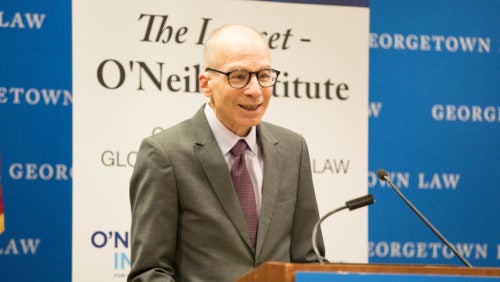
The O'Neill Institute for National and Global Health Law and The Lancet medical journal have teamed up to create a Lancet-O’Neill Institute Commission, chaired by University Professor Lawrence O. Gostin (pictured) and John T. Monahan (C’83, L’87), to explore the vital role of law in responding to major global health law challenges.
The O’Neill Institute for National and Global Health Law at Georgetown Law has teamed up with The Lancet — the world’s oldest and best known medical journal — to examine how law can be used to advance the right to health in the United States and around the world.
The two institutions have created a Lancet-O’Neill Institute Commission, chaired by University Professor Lawrence O. Gostin and John T. Monahan (C’83, L’87), to explore the vital role of law in responding to major global health law challenges.
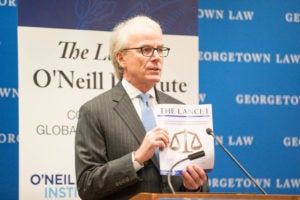
Timothy O’Neill (L’77).
And on May 1, the Commission launched a groundbreaking report examining how law can be used to improve health. The launch of the report, with seven recommendations linking health and law, was celebrated with a half day of discussions at Georgetown Law.
The event was introduced by Georgetown Law Dean William M. Treanor; Georgetown University Medical Center Executive Dean Edward Healton; Monahan (the senior adviser to Georgetown University President John J. DeGioia); and Timothy O’Neill (L’77), whose generous support, along with that of his wife Linda O’Neill (NHS’77), helped create the O’Neill Institute in 2007.
“If you are known by the company you keep, The Lancet and the O’Neill Institute has a nice ring to it…” O’Neill said. “The guiding principle of the Institute was that there’s an underutilized capacity of the law to influence all the missions of global health: access, affordability, compliance…global health with justice.”
‘Incredible Day’
Gostin — a pioneer in global health law whose roles include faculty director of the O’Neill Institute and director of the World Health Organization Collaborating Center on Public Health Law and Human Rights — called it an “incredible day.”
Gostin recalled being asked by a senior official at the World Health Organization what the law has to do with health. “Everything,” Gostin answered.
“Medicine of course is a lifesaver, and a doctor can save one life,” he said. “But good law with justice can save billions of lives.”
Tobacco control, Gostin noted, has saved 30 million lives globally. Taxes on tobacco, alcohol and sugary beverages would save 50 million lives. Laws have prevented deaths from gunshots and traffic injuries. As Gostin explains in his book Global Health Law (Harvard University Press), advancements in health result from many determinants including good governance, security, clean air, clean water, access to medicines and more.
“Good governance and the rule of law are not only intrinsic values in their own right for justice,” Gostin said, “but they are very good for health.”
Health Challenges at Home and Abroad
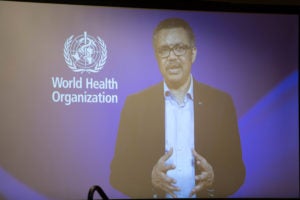
Dr. Tedros Adhanom Ghebreyesus.
The day began with a video welcome by Dr. Tedros Adhanom Ghebreyesus, director-general of the World Health Organization in Geneva, Switzerland, emphasizing the importance of health with justice. Donna Shalala, the former secretary of the U.S. Department of Health and Human Services (1993-2001) who is now a U.S. Representative from Florida, followed up with a keynote address on “Why Law Matters.”
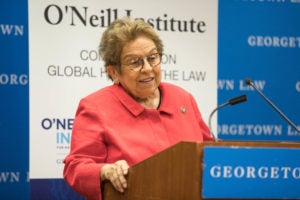
U.S. Rep. Donna Shalala.
“We have made the greatest health gains in the world by looking back at our first ones — the initial public health moves around the world, but particularly in this country — sanitation, clean water, building codes. Who would connect building codes to health care?” Shalala asked. “But building codes turned out to be extremely important in terms of the laws that related to health.”
(Notably, a recent Georgetown University initiative, the Health Justice Alliance, pairs law students and medical students to advance health justice through areas like landlord-tenant law.)
A panel on global health challenges, chaired by Gostin, examined the law as a tool to save lives with respect to ending the HIV/AIDS pandemic (presentation by Dr. Anthony Fauci, director of the National Institute of Allergy and Infectious Diseases); constitutions around the world that respect a right to health (Dr. Matthew Kavanagh, visiting professor and director of the O’Neill Institute’s Global Health Policy and Governance Initiative); the role of vaccines in reaching global health with justice (Bruce Gellen, president of global immunization at the Sabin Vaccine Institute); using diplomacy to make a difference in health (Bonnie Jenkins, former ambassador at the U.S. State Department, 2009-2017); and global health security with respect to Ebola and other infectious diseases (Victor Dzau, president of the U.S. National Academy of Medicine).
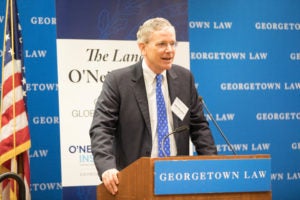
John T. Monahan.
A panel on U.S. health challenges, led by Monahan, looked at why the U.S. health system is broken (presentation by Professor from Practice Timothy Westmoreland, former director of the Medicaid program); HIV/AIDS and Hepatitis (Jeffrey Crowley, program director of Infectious Disease Initiatives at the O’Neill Institute); the opioid crisis (Regina LaBelle (L’ 92), program director of the Addiction and Public Policy Initiative at the O’Neill Institute); and non-communicable diseases and injuries (American University Law Professor Lindsay Wiley.
“The lines between domestic and global health are completely and permanently blurred, as they should be,” Monahan said. “U.S. health is part of global health, and global health isn’t about health that goes on in other places…we are a part of that discussion.”